Title search results
Showing 1488001 - 1488020 of 1503121 items
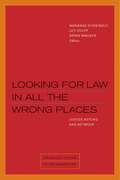
Looking for Law in All the Wrong Places: Justice Beyond and Between (Berkeley Forum in the Humanities)
By Wendy Brown, Saba Mahmood, Daniel Boyarin, Christopher Tomlins, Samera Esmeir, Ramona Naddaff, Kathryn Abrams, Sara Ludin, Sarah Song, Rebecca M. McLennan, Bath H. Piatote, Daniel Fisher. 2019
For many inside and outside the legal academy, the right place to look for law is in constitutions, statutes, and…
judicial opinions. This book looks for law in the “wrong places”—sites and spaces in which no formal law appears. These may be geographic regions beyond the reach of law, everyday practices ungoverned or ungovernable by law, or works of art that have escaped law’s constraints.Looking for Law in All the Wrong Places brings together essays by leading scholars of anthropology, cultural studies, history, law, literature, political science, race and ethnic studies, religion, and rhetoric, to look at law from the standpoint of the humanities. Beyond showing law to be determined by or determinative of distinct cultural phenomena, the contributors show how law is itself interwoven with language, text, image, and culture.Many essays in this volume look for law precisely in the kinds of “wrong places” where there appears to be no law. They find in these places not only reflections and remains of law, but also rules and practices that seem indistinguishable from law and raise challenging questions about the locations of law and about law’s meaning and function. Other essays do the opposite: rather than looking for law in places where law does not obviously appear, they look in statute books and courtrooms from perspectives that are usually presumed to have nothing to say about law.Looking at law sideways, or upside down, or inside out defamiliarizes law. These essays show what legal understanding can gain when law is denied its ostensibly proper domain.Contributors: Kathryn Abrams, Daniel Boyarin, Wendy Brown, Marianne Constable, Samera Esmeir, Daniel Fisher, Sara Ludin, Saba Mahmood, Rebecca McLennan, Ramona Naddaff, Beth Piatote, Sarah Song, Christopher Tomlins, Leti Volpp, Bryan Wagner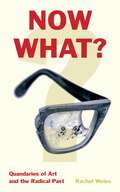
Now What?: Quandaries of Art and the Radical Past
By Rachel Weiss. 2021
Now What? is an innovative exploration of artworks and films that return to radical histories subject to erasure or otherwise…
lost or occluded over time. The moments returned to—the Cuban Revolution, Chile’s 1973 coup d’état, the ambiguous 1989 “revolution” in Romania, and the mayhem surrounding the Red Army Faction in 1970s West Germany—stand as historical watersheds, foundational and precipitate moments in the history of radical politics. Delving into these key historical moments by way of Tania Bruguera’s 2009 performance Tatlin’s Whisper in Havana, filmmaker Patricio Guzmán’s decades-long cycle of returns to Allende’s Chile, Harun Farocki and Andrei Ujica’s Videograms of a Revolution, Corneliu Porumboiu’s 12:08 East of Bucharest, the film Germany in Autumn, and Gerhard Richter’s October 18, 1977 suite of paintings, Rachel Weiss convincingly threads these works together through subtle and illuminating reflections on the complex dynamics involved in historical trauma and memory, addressing key questions about the meanings and uses of the past.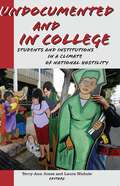
Undocumented and in College: Students and Institutions in a Climate of National Hostility
By Terry-Ann Jones and Laura Nichols, Editors. 2017
The current daily experiences of undocumented students as they navigate the processes of entering and then thriving in Jesuit colleges…
are explored alongside an investigation of the knowledge and attitudes among staff and faculty about undocumented students in their midst, and the institutional response to their presence. Cutting across the fields of U.S. immigration policy, theory and history, religion, law, and education, Undocumented and in College delineates the historical and present-day contexts of immigration, including the role of religious institutions. This unique volume, based on an extensive two-year study (2010–12) of undocumented students at Jesuit colleges in the United States and with contributions from various scholars working within these institutions, incorporates survey research and in-depth interviews to present the perspectives of students, staff, and the institutions.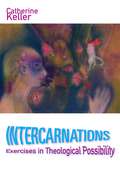
Intercarnations: Exercises in Theological Possibility
By Catherine Keller. 2017
Intercarnations is an outstanding collection of provocative, elegantly written essays—many available in print for the first time—by renowned theologian Catherine…
Keller.Affirmations of body, flesh, and matter pervade current theology and inevitably echo with the doctrine of the incarnation. Yet, in practice, materialism remains contested ground—between Marxist and capitalist, reductive and postmodern iterations. Current theological explorations of our material ecologies cannot elude the tug or drag of the doctrine of “the incarnation.” But what if we were to redistribute, rather than repress, that singular body? Might we free it—along with the bodies in which it is boundlessly entangled—from a troubling history of Christian exceptionalism?In these immensely significant, highly original essays, theologian Catherine Keller proposes to liberate the notion of the divine made flesh from the exclusivity of orthodox Christian theology’s Jesus of Nazareth. Throughout eleven scintillating essays, she attends to bodies diversely religious, irreligious, social, animal, female, queer, cosmopolitan, and cosmic, highlighting the intermittencies and interdependencies of intra-world relations. According to Keller, when God is cast on the waters of a polydoxical indeterminacy, s/he/it returns manifold. For the many for whom theos has become impossible, Intercarnations exercises new theological possibilities through the diffraction of contextually diverse multiplicities.A groundbreaking work that pulls together a wide range of intersecting topics and methodologies, Intercarnations enriches and challenges current theological thinking. The essays reach back into feminist, process, and postcolonial discourses, and further back into messianic and mystical potentialities. They reach out into Asian as well as inter-Abrahamic comparison and forward toward a political theology of the Earth, queerly entangling climate catastrophe in materializations resistant to every economic, social, and anthropic exceptionalism. According to Keller, Intercarnations offers itself as a transient trope for the mattering of our entangled difference, meaning to stir up practices of a better planetarity. In Intercarnations, with Catherine Keller as their erudite guide, readers gain access to new worlds of theological possibility and perception.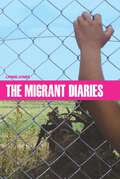
The Migrant Diaries (International Humanitarian Affairs)
By Lynne Jones. 2020
What is it like to run away from bombing, lose your family, and work out how to take care of…
yourself in a foreign country when you are seven years old? What do you do when the woman who promised you a good job in Europe turns out to have sold you into prostitution? How do you escape from torture and detention in Libya? What is it like to almost drown in the Mediterranean and then be confined in a garbage and rat-filled settlement on a Greek island for years?In this book, Lynne Jones answers these questions by combining direct testimony from children with a blazingly frank eyewitness account of providing mental health support on the front line of the migrant crisis across Europe and Central America in the past five years. Her diaries document how a compassionate welcome shifted to indifference and hostility toward those seeking refuge from war, disaster, and poverty in the richest countries in the world. They shine light on what it is like to be caught up on the front lines of the migrant crises in Europe and Central America, either as a person in flight or as a volunteer trying to help. They show how people who have fled war, poverty, and disaster—trapped in degrading, humiliating living conditions—have responded with resourcefulness and creativity. In the absence of most large professional humanitarian agencies, migrants and volunteers together have created a new form of humanitarianism that challenges old ways of working.Today there are 79 million forcibly displaced people in the world today, 1 percent of the world’s population. Understanding the perspectives of people on the move has never been more important.The Author's profits from this book will be donated to the charity: CHOOSE LOVE/HELP REFUGEES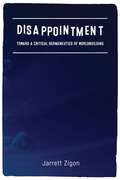
Disappointment: Toward a Critical Hermeneutics of Worldbuilding
By Jarrett Zigon. 2018
Increasingly, anthropologists, political theorists and philosophers are calling for imaginative and creative analyses and theories that might help us think…
and bring about an otherwise. Disappointment responds to this call by showing how collaboration between an anthropologist and a political movement of marginalized peoples can disclose new possibilities for being and acting politically. Drawing from nearly a decade of research with the global anti-drug war movement, Jarrett Zigon puts ethnography in dialogue with both political theory and continental philosophy to rethink some of the most fundamental ontological, political and ethical concepts. The result is to show that ontological starting points have real political implications, and thus, how an alternative ontological starting point can lead to new possibilities for building worlds more ethically attuned to their inhabitants.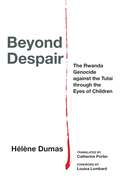
Winner, Prix Pierre LafueWinner, Prix lycéen du livre d’histoire des Rendez-vous de l’histoire de BloisIn the archives of the main…
institution in charge of the history and memory of the genocide in Rwanda, several bundles of fragile little school notebooks contain, in the silence of accumulated dust, the stories of around a hundred surviving children. Written in 2006 at the initiative of a Rwandan survivors’ association, as a testimonial and psychological catharsis, these accounts by children who have since become young men and women tell the story of their experience of the genocide, as well as of “life before” and “life after.” The words of these children, the cruel realism of the scenes they describe, the power of the emotions they express, provide the historian with an unparalleled insight into the subjectivities of the survivors, and also enable us to take on board the murderous discourse and gestures of those who eradicated their world of childhood forever. Far from abstract postulates on the “unspeakable,” Beyond Despair offers a reflection on the conditions that make audible such an experience of dereliction in the twilight of the twentieth century.This work received support for excellence in publication and translation from Albertine Translation, a program created by Villa Albertine and funded by FACE Foundation.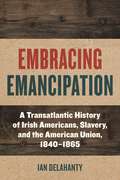
WINNER, 2024 LAWRENCE J. McCAFFREY PRIZE FOR BEST BOOK ON IRISH AMERICAChallenges conventional narratives of the Civil War era that…
emphasize Irish Americans’ unceasing opposition to Black freedomEmbracing Emancipation tackles a perennial question in scholarship on the Civil War era: Why did Irish Americans, who claimed to have been oppressed in Ireland, so vehemently opposed the antislavery movement in the United States? Challenging conventional answers to this question that focus on the cultural, political, and economic circumstances of the Irish in America, Embracing Emancipation locates the origins of Irish American opposition to antislavery in famine-era Ireland. There, a distinctively Irish critique of abolitionism emerged during the 1840s, one that was adopted and adapted by Irish Americans during the sectional crisis. The Irish critique of abolitionism meshed with Irish Americans’ belief that the American Union would uplift Irish people on both sides of the Atlantic—if only it could be saved from the forces of disunion.Whereas conventional accounts of the Civil War itself emphasize Irish immigrants’ involvement in the New York City draft riots as a brutal coda to their unflinching opposition to emancipation, Delahanty uncovers a history of Irish Americans who embraced emancipation. Irish American soldiers realized that aiding Black southerners’ attempts at self-liberation would help to subdue the Confederate rebellion. Wartime developments in the United States and Ireland affirmed Irish American Unionists’ belief that the perpetuity of their adopted country was vital to the economic and political prospects of current and future immigrants and to their hopes for Ireland’s independence. Even as some Irish immigrants evinced their disdain for emancipation by lashing out against Union authorities and African Americans in northern cities, many others argued that their transatlantic interests in restoring the Union now aligned with slavery’s demise. While myriad Irish Americans ultimately abandoned their hostility to antislavery, their backgrounds in and continuously renewed connections with Ireland remained consistent influences on how the Irish in America took part in debate over the future of American slavery.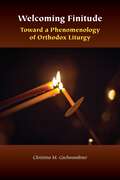
Welcoming Finitude: Toward a Phenomenology of Orthodox Liturgy (Orthodox Christianity and Contemporary Thought)
By Christina M. Gschwandtner. 2019
What does it mean to experience and engage in religious ritual? How does liturgy structure time and space? How do…
our bodies move within liturgy, and what impact does it have on our senses? How does the experience of ritual affect us and shape our emotions or dispositions? How is liturgy experienced as a communal event, and how does it form the identity of those who participate in it? Welcoming Finitude explores these broader questions about religious experience by focusing on the manifestation of liturgical experience in the Eastern Christian tradition. Drawing on the methodological tools of contemporary phenomenology and on insights from liturgical theology, the book constitutes a philosophical exploration of Orthodox liturgical experience.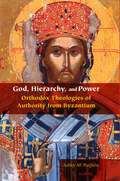
In the current age where democratic and egalitarian ideals have preeminence, Eastern Orthodox Christianity, among other hierarchically organized religious traditions,…
faces the challenging questions: “Why is hierarchy maintained as the model of organizing the church, and what are the theological justifications for its persistence?” These questions are especially significant for historically and contemporarily understanding how Orthodox Christians negotiate their spiritual ideals with the challenges of their social and ecclesiastical realities.To critically address these questions, this book offers four case studies of historically disparate Byzantine theologians from the sixth to the fourteenth-centuries—Dionysius the Areopagite, Maximus the Confessor, Niketas Stethatos, and Nicholas Cabasilas—who significantly reflect on the relationship between spiritual authority, power, and hierarchy in theoretical, liturgical, and practical contexts. Although Dionysius the Areopagite has been the subject of much scholarly interest in recent years, the applied theological legacy of his development of “hierarchy” in the Christian East has not before been explored.Relying on a common Dionysian heritage, these Byzantine authors are brought into a common dialogue to reveal a tradition of constructing authentic ecclesiastical hierarchy as foremost that which communicates divinity.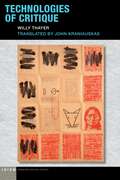
Technologies of Critique (Idiom: Inventing Writing Theory)
By Willy Thayer. 2020
Critique—a program of thought as well as a disposition toward the world—is a crucial resource for politics and thought today,…
yet it is again and again instrumentalized by institutional frames and captured by market logics. Technologies of Critique elaborates a critical practice that eludes such capture. Building on Chile’s history of dissident artists and the central entangling of politics and aesthetics, Thayer engages continental philosophical traditions, from Aristotle, Descartes and Heidegger through Walter Benjamin and Gilles Deleuze, and in implicit conversation with the Judith Butler, Roberto Esposito, and Bruno Latour, to help pinpoint the technologies and media through which art intervenes critically in socio-political life.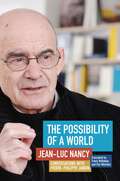
The Possibility of a World: Conversations with Pierre-Philippe Jandin
By Jean-Luc Nancy, Pierre-Philippe Jandin. 2017
In this series of interviews, Jean-Luc Nancy reviews his life’s work. But like Schlegel’s historian—“a prophet facing backwards”—Nancy takes this…
opportunity to rummage through the history of art, philosophy, religion, and politics in search of new possibilities that remain to be thought.This journey through Nancy’s thought is interspersed with accounts of places and events and deeply personal details. The result is at once unpretentious and encyclopedic: Concepts are described with remarkable nuance and specificity, but in a language that comes close to that of everyday life.As Nancy surveys his work, he thinks anew about democracy, community, jouissance, love, Christianity, and the arts. In the end, this is a book about the possibility of a world—a world that must be greeted because it is, as Nancy says, already here.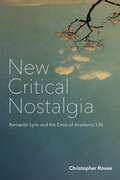
New Critical Nostalgia: Romantic Lyric and the Crisis of Academic Life (Lit Z)
By Christopher Rovee. 2024
New Critical Nostalgia weighs the future of literary study by reassessing its past. It tracks today's impassioned debates about method…
back to the discipline’s early professional era, when an unprecedented makeover of American higher education with far-reaching social consequences resulted in what we might call our first crisis of academic life. Rovee probes literary study’s nostalgic attachments to this past, by recasting an essential episode in the historiography of English—the vigorous rejection of romanticism by American New Critics—in the new light of the American university’s tectonic growth. In the process, he demonstrates literary study’s profound investment in romanticism and reveals the romantic lyric’s special affect, nostalgia, as having been part of English’s professional identity all along. New Critical Nostalgia meticulously shows what is lost in reducing mid-century American criticism and the intense, quirky, and unpredictable writings of central figures, such as Cleanth Brooks, Josephine Miles, and W. K. Wimsatt, to a glib monolith of New Critical anti-romanticism. In Rovee’s historically rich account, grounded in analysis of critical texts and enlivened by archival study, readers discover John Crowe Ransom’s and William Wordsworth’s shared existential nostalgia, witness the demolition of the “immature” Percy Shelley in the revolutionary textbook Understanding Poetry, explore the classroom give-and-take prompted by the close reading of John Keats, consider the strange ambivalence toward Lord Byron on the part of formalist critics and romantic scholars alike, and encounter the strikingly contemporary quantitative studies by one of the mid-century’s preeminent poetry scholars, Josephine Miles. These complex and enthralling engagements with the romantic lyric introduce the reader to a dynamic intellectual milieu, in which professionals with varying methodological commitments (from New Critics to computationalists), working in radically different academic locales (from Nashville and New Haven to Baton Rouge and Berkeley), wrangled over what it means to read, with nothing less than the future of the discipline at stake.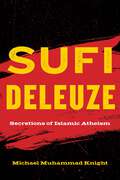
Sufi Deleuze: Secretions of Islamic Atheism
By Michael Muhammad Knight. 2023
“There is always an atheism to be extracted from a religion,” Deleuze and Guattari write in their final collaboration, What…
Is Philosophy? Their claim that Christianity “secretes” atheism “more than any other religion,” however, reflects the limits of their archive. Theological projects seeking to engage Deleuze remain embedded within Christian theologies and intellectual histories; whether they embrace, resist, or negotiate with Deleuze’s atheism, the atheism in question remains one extracted from Christian theology, a Christian atheism. In Sufi Deleuze, Michael Muhammad Knight offers an intervention, engaging Deleuzian questions and themes from within Islamic tradition. Even if Deleuze did not think of himself as a theologian, Knight argues, to place Deleuze in conversation with Islam is a project of comparative theology and faces the challenge of any comparative theology: It seemingly demands that complex, internally diverse traditions can speak as coherent, monolithic wholes. To start from such a place would not only defy Islam’s historical multiplicity but also betray Deleuze’s model of the assemblage, which requires attention to not only the organizing and stabilizing tendencies within a structure but also the points at which a structure resists organization, its internal heterogeneity, and unpredictable “lines of flight.”A Deleuzian approach to Islamic theology would first have to affirm that there is no such thing as a universal “Islamic theology” that can speak for all Muslims in all historical settings, but rather a multiplicity of power struggles between major and minor forces that contest each other over authenticity, authority, and the making of “orthodoxy.” The discussions in Sufi Deleuze thus highlight Islam’s extraordinary range of possibilities, not only making use of canonically privileged materials such as the Qur’an and major hadith collections, but also exploring a variety of marginalized resources found throughout Islam that challenge the notion of a singular “mainstream” interpretive tradition. To say it in Deleuze’s vocabulary, Islam is a rhizome.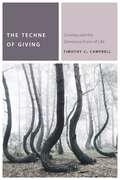
The Techne of Giving: Cinema and the Generous Form of Life (Commonalities)
By Timothy C. Campbell. 2017
Over the last five years, corporations and individuals have given more money, more often, to charitable organizations than ever before.…
What could possibly be the downside to inhabiting a golden age of gift-giving? That question lies at the heart of Timothy Campbell’s account of contemporary giving and its social forms. In a milieu where gift-giving dominates, nearly everything given and received becomes the subject of a calculus—gifts from God, from benefactors, from those who have. Is there another way to conceive of generosity? What would giving and receiving without gifts look like?A lucid and imaginative intervention in both European philosophy and film theory, The Techne of Giving investigates how we hold the objects of daily life—indeed, how we hold ourselves—in relation to neoliberal forms of gift-giving. Even as instrumentalism permeates giving, Campbell articulates a resistant techne locatable in forms of generosity that fail to coincide with biopower’s assertion that the only gifts that count are those given and received. Moving between visual studies, Winnicottian psychoanalysis, Foucauldian biopower, and apparatus theory, Campbell makes a case for how to give and receive without giving gifts. In the conversation between political philosophy and classic Italian films by Visconti, Rossellini, and Antonioni, the potential emerges of a generous form of life that can cross between the visible and invisible, the fated and the free.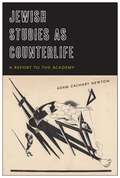
Jewish Studies as Counterlife: A Report to the Academy
By Adam Zachary Newton. 2019
This book tells the story of a Jewish Studies that hasn’t fully happened—at least not yet. Newton asks what we…
mean when we say “Jewish Studies”—and when we imagine it not as mere amalgam but as a project. Jewish Studies offers a unique perspective from which to view the horizon of the academic humanities because, although it arrived belatedly, it has spanned a range of disciplinary locations and configurations, from an “origin story” in nineteenth-century historicism and philology, to the emancipatory politics of the Enlightenment, to the ethnicity-driven pluralism of the postwar decades, to more recent configurations within an interdisciplinary cultural studies. The conflicted allegiances with respect to traditions, disciplines, divisions, stakes, and stakeholders represent the structural and historical situation of the field, as it comes into contact with the humanities more broadly.At once a literary and philosophical thinker, Newton deploys a tableau of texts in concert with an ensemble of vivid, elastic tropes not only to theorize Jewish Studies but also to reimagine it as an agent of that potency Jacques Derrida calls “leverage”—a force multiplier for the field’s multiple possibilities. In refiguring a Jewish Studies to come, the book intervenes in a broader discourse about the challenge of professing disciplinary knowledges while promoting transit across their boundaries. Jewish Studies as Counterlife further amplifies Newton’s career-long articulation of the dialogic as the staging ground of ethical encounter.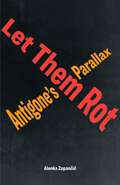
Let Them Rot: Antigone’s Parallax (Idiom: Inventing Writing Theory)
By Alenka Zupančič. 2023
A provocative, highly accessible journey to the heart of Sophocles’ Antigone elucidating why it keeps resurfacing as a central text…
of Western thought and Western culture.There is probably no classical text that has inspired more interpretation, critical attention, and creative response than Sophocles’ Antigone. The general perspective from which the book is written could be summarized with this simple question: What is it about the figure of Antigone that keeps haunting us? Why do all these readings and rewritings keep emerging? To what kind of always contemporary contradiction does the need, the urge to reread and reimagine Antigone—in all kinds of contexts and languages—correspond? As key anchor points of this general interrogation, three particular “obsessions” have driven the author’s thinking and writing about Antigone. First is the issue of violence. The violence in Antigone is the opposite of “graphic” as we have come to know it in movies and in the media; rather, it is sharp and piercing, it goes straight to the bone. It is the violence of language, the violence of principles, the violence of desire, the violence of subjectivity. Then there is the issue of funerary rites and their role in appeasing the specific “undeadness” that seems to be the other side of human life, its irreducible undercurrent that death alone cannot end and put to rest. This issue prompted the author to look at the relationship between language, sexuality, death, and “second death.” The third issue, which constitutes the focal point of the book, is Antigone’s statement that if it were her children or husband lying unburied out there, she would let them rot and not take it upon herself to defy the decree of the state. The author asks, how does this exclusivist, singularizing claim (she would do it only for Polyneices), which she uses to describe the “unwritten law” she follows, tally with Antigone’s universal appeal and compelling power? Attempting to answer this leads to the question of what this particular (Oedipal) family’s misfortune, of which Antigone chooses to be the guardian, shares with the general condition of humanity. Which in turn forces us to confront the seemingly self-evident question: “What is incest?”Let Them Rot is Alenka Zupančič’s absorbing and succinct guided tour of the philosophical and psychoanalytic issues arising from the Theban trilogy. Her original and surprising intervention into the broad and prominent field of study related to Sophocles’ Antigone illuminates the classical text’s ongoing relevance and invites a wide readership to become captivated by its themes.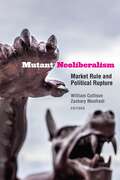
Mutant Neoliberalism: Market Rule and Political Rupture
By William Callison and Zachary Manfredi. 2020
Tales of neoliberalism’s death are serially overstated. Following the financial crisis of 2008, neoliberalism was proclaimed a “zombie,” a disgraced…
ideology that staggered on like an undead monster. After the political ruptures of 2016, commentators were quick to announce “the end” of neoliberalism yet again, pointing to both the global rise of far-right forces and the reinvigoration of democratic socialist politics. But do new political forces sound neoliberalism’s death knell or will they instead catalyze new mutations in its dynamic development?Mutant Neoliberalism brings together leading scholars of neoliberalism—political theorists, historians, philosophers, anthropologists and sociologists—to rethink transformations in market rule and their relation to ongoing political ruptures. The chapters show how years of neoliberal governance, policy, and depoliticization created the conditions for thriving reactionary forces, while also reflecting on whether recent trends will challenge, reconfigure, or extend neoliberalism’s reach. The contributors reconsider neoliberalism’s relationship with its assumed adversaries and map mutations in financialized capitalism and governance across time and space—from Europe and the United States to China and India. Taken together, the volume recasts the stakes of contemporary debate and reorients critique and resistance within a rapidly changing landscape.Contributors: Étienne Balibar, Sören Brandes, Wendy Brown, Melinda Cooper, Julia Elyachar, Michel Feher, Megan Moodie, Christopher Newfield, Dieter Plehwe, Lisa Rofel, Leslie Salzinger, Quinn Slobodian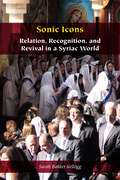
Sonic Icons: Relation, Recognition, and Revival in a Syriac World (Orthodox Christianity and Contemporary Thought)
By Sarah Bakker Kellogg. 2025
A vivid, artfully crafted, and deeply hopeful account of one community’s struggle to rediscover and reinvent itself after a century…
of genocidal loss, dispossession, and displacementTo the extent that Middle Eastern Christians register in Euro-American political imaginaries, they are usually invoked to justify Western military intervention into countries like Iraq or Syria, or as an exemption to anti-Islamic immigration policies because of an assumption that their Christianity makes them easily assimilable in the so-called “Judeo-Christian” West.Using the tools of multisensory ethnography, Sonic Icons uncovers how these views work against the very communities they are meant to benefit. Through long term fieldwork in the Netherlands among Syriac Orthodox Christians—also known as Assyrians, Aramaeans, and Syriacs—Bakker Kellogg reveals how they intertwine religious practice with political activism to save Syriac Christianity from the twin threats of political violence in the Middle East and cultural assimilation in Europe.In a historical moment when much of their tradition has been forgotten or destroyed, their story of self-discovery is one of survival and reinvention. By reviving the late antique Syriac liturgical tradition known as the Daughters and Sons of the Covenant, they seek a complex form of recognition for what they understand to be the ethical core of Christian kinship in an ethnic as well as in a religious sense, despite living in societies that do not recognize this unhyphenated form of ethnoreligiosity as a politically legitimate mode of public identity. Drawing on both theological and linguistic understandings of the icon, Sonic Icons rethinks foundational theoretical accounts of ethnicization, racialization, and secularization by examining how kinship gets made, claimed, and named in the global politics of minority recognition. The icon, as a site of communicative and reproductive power, illuminates how these processes are shaped by religious histories of struggle for sovereignty over the reproductive future.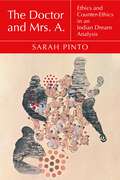
Just before India’s independence, a young Punjabi woman, ill at ease in her marriage and eager for personal and national…
freedom, sat down with psychiatrist Dev Satya Nand for an experiment in his new method of dream analysis. The published analysis documents a surge of emotion and reflections on sexuality, gender, marriage, ambition, trauma, and art. “Mrs. A.” (as she is known) turned to female figures from Hindu myth to reimagine her social world and its ethical arrangements, envisioning a future beyond marriage, colonial rule, and gendered constraints.This book explores the conversation between Mrs. A. and Satya Nand, its window onto gender and sexuality in late colonial Indian society, and the ways Mrs. A. put ethics in motion, creating alternatives to ideals of belonging, recognition, and consciousness. It finds in Mrs. A.’s musings repertoires for the creative transformation of ideals and explores the possibilities of thinking with a dynamic concept of counter-ethics. An unconventional history of gender and sexuality in late colonialism, this book reminds us that the west did not invent feminism, that psychiatry’s history of innovation and creativity is global, and that ethical thinking does not need to center on western myths or paradigms.